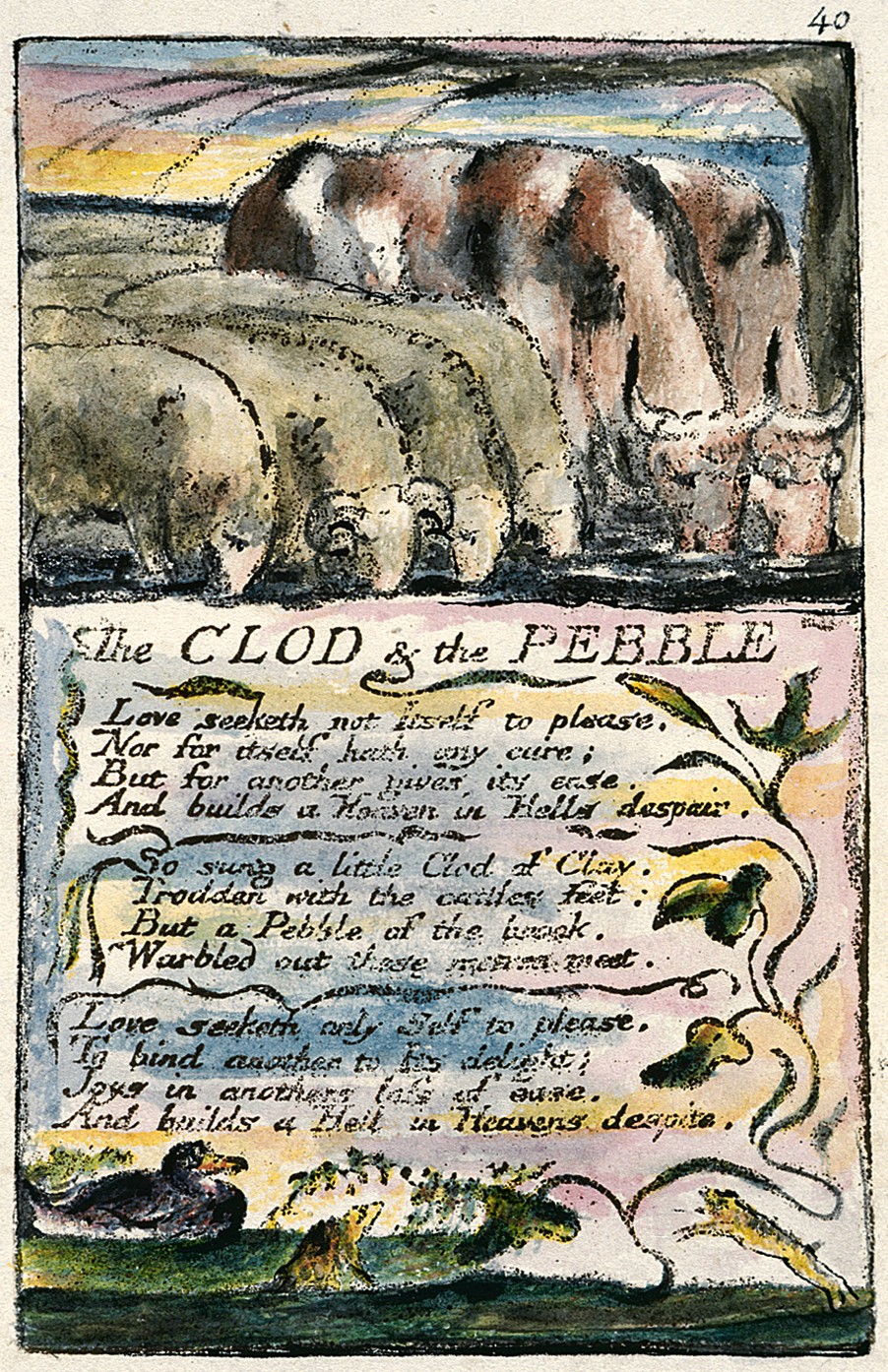 |
| Wikipedia Commons Songs of Innocence & of Experience Plate 40, Copy L |
A very elementary lesson about love confronts the reader of "The Clod and the Pebble". It shows with stark simplicity the two kinds of love, divine and demonic.
Two kinds of love! Blake will explore the pebble's love with its infinite variety of forms before he allows us to rest again in the love of God. Blake's poem,Visionsof the Daughters of Albion, (Look also at the Plates) begins with the words, "I loved Theotormon".
The heroine, Oothoon, thus describes the first significant act in a life of horror. Before the consummation of her love for Theotormon she is raped by Bromion. Then Theotormon won't have her; well named, he's tormented by God. Woman as a possession makes life hell for everyone. Here we find Blake's first full manifestation of the "torments of love and jealousy".
At the climax of this strange love song, with the irony all spent, Oothoon properly assesses conventional love and brands it,
"self-love
that envies all, a creeping skeleton With lamplike eyes watching
around the frozen marriage bed."
Those
are hot, passionate words of righteous indignation at what fallen men
have made of love. Oothoon then proceeds to offer a happier form of
married love:
"But
silken nets and traps of adamant will Oothoon spread, And catch for
thee girls of mild silver, or of furious gold. I'll lie beside thee
on a bank & view their wanton play In lovely copulation, bliss on
bliss, with Theotormon"
With these extravagant images the young poet shocks his reader into an awareness of love's spectrum of value. In the ironic language of 'The Marriage of Heaven and Hell' the first, jealous love, is the love of Heaven or Restraint, and the second, the selfless love, is that of Hell or Eternal Delight. This version of values set the style for Blake's use of the word. It became in his hands a sharp sword penetrating to the core of society's ills.
The subtitle of The Four Zoas begins, "The Torments of Love & Jealousy". Violent and passionate feelings characterize the entire epic. As soon as the reader can envision 4Z as a whole, he will perceive that all these passionate feelings in all of these characters have a common destructiveness and alienating effect, until the Momentof Grace recorded in Night vii. Love, hate, fear, pride, humiliation, all are united in this common fallenness.
In Night i the primeval pair, Los and Enitharmon, set the tone for the meaning of love in this fallen world. (They all too aptly portray the emotional universe of many married couples):
"Alternate
Love & Hate [filled] his breast: hers Scorn & Jealousy".
Enitharmon believes love to be a one way street. Speaking to Los of
their parents:
"...if we grateful prove
They will withhold sweet love,
whose food is thorns & bitter roots."
"...if we grateful prove
They will withhold sweet love,
whose food is thorns & bitter roots."
And in Night ii she announces her philosophy of the relations between man and woman:
"The joy of woman is the death of her most best beloved
Who dies for Love of her
In
torments of fierce jealousy & pangs of adoration."
There you have love at its worst! This fairly represents Blake's ironic use of the word in his major work. In Blake's symbolic structure of thought love is most often a function of woman, who is a symbol of fallenness . Not until 'Jerusalem' do we meet the feminine embodiment of the Christian graces, among them love divine.
The notebookpoem which begins, "My Spectre around me night and day" merits study as an approach to understanding the use of Blake's symbolism to express his deepest feelings about life. I quote the climax of it. In the first verse Blake means by 'love' very much what Paul in Romans 8 meant by 'flesh'. In the second, without using the word, he expresses in the fullest possible way what divine love meant to him:
"Let us agree to give up Love,
And root up the infernal grove;
Then shall we return & see
The worlds of happy Eternity.
& Throughout all Eternity
I forgive you, you forgive me.
As our dear Redeemer said:
This
the Wine & this the Bread."
As these lines suggest, Blake had a strong sense of reticence about using the sacred words in the sacred sense, perhaps because he had so exhaustively explored their profane senses. Nevertheless in the poem "William Bond" from the Pickering Manuscript he gave an exquisite portrait of romantic love, purified of fallenness and filled with the divine. Read the last two verses:
"I thought Love liv'd in the hot sun shine,
But O, he lives in the Moony light!
I thought to find Love in the heat of day,
But sweet Love is the Comforter of Night.
Seek Love in the Pity of others' Woe,
In
the gentle relief of another's care,
In the darkness of night & the winter's snow,
In the naked & outcast, Seek Love there!"
.
In the darkness of night & the winter's snow,
In the naked & outcast, Seek Love there!"
.

No comments:
Post a Comment